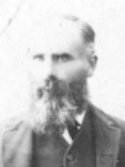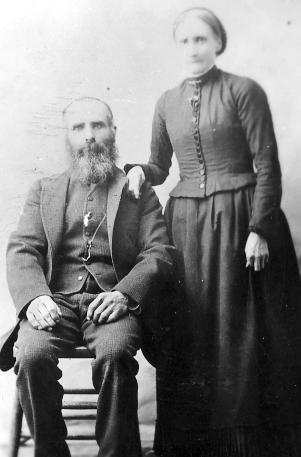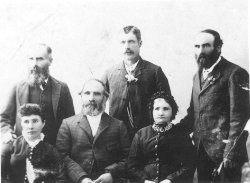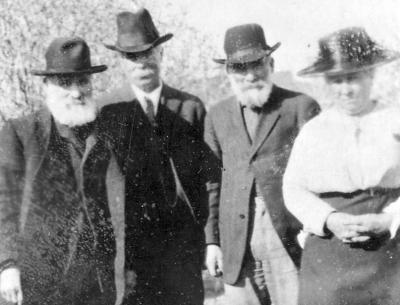 My great grandfather, Edward Kimber was born on November 24, 1841, at Thatcham County, Berkshire, England, the son of Charles Kimber Sr. and Caroline Sellwood. He was married to Mary Stanbrook on December 29, 1866. Six children were born to him and his good wife. They were: Alice, Elizabeth, and Ellen, twins, Fannie, my grandmother, Mary Ann, and one boy, Edward Charles. The twin girls died in 1870 and 1871.
My great grandfather, Edward Kimber was born on November 24, 1841, at Thatcham County, Berkshire, England, the son of Charles Kimber Sr. and Caroline Sellwood. He was married to Mary Stanbrook on December 29, 1866. Six children were born to him and his good wife. They were: Alice, Elizabeth, and Ellen, twins, Fannie, my grandmother, Mary Ann, and one boy, Edward Charles. The twin girls died in 1870 and 1871.
They lived in a little village of Long Lane, England, about four miles from the large town of Newbury. Alice, the oldest girl, attended school at Courage, and later a girls school at Hermit Edge. My great Aunt Alice told me this story and she can remember going to meeting with her father. They were held on the commons which were upon the greens surrounded by trees. Great grandfather joined the church over there, but Aunt Alice could not remember the missionaries coming to the home. Great grandmother did not join the church there. She did not care about the religion.

Edward & Mary Kimber
Great grandfather wanted to come to America so badly that she consented to come with him. She said her Grandmother Stanbrook came to tell them goodbye, but she could not say it. As she turned and started walking back down the path home, Aunt Alice went running to her and put her arms around her and kissed her goodbye. It was a very sad parting for they were so dear to one another. As far as the family knows she was the only one that ever joined the church and came over here. However, her family’s temple work was done in 1948.
The young son, Edward Charles, was not very well so great grandmother consulted the doctor. He thought he would be able to stand the trip to America, so they made immediate preparation. They came to join great-great grandfather, Charles Kimber, and his family, who had come in 1868 in a sailing vessel and had settled in Grouse Creek. The Edward Kimber family, however, came on the steamship “Wyoming” in 1879. A group of saints gathered to wish them farewell and as they were going down the gang plank they sang, “Oh, Babylon, Oh, Babylon, we bid thee farewell. We’re going to the mountains of Ephriam to dwell.” This trip was very much of an adventure, especially for the children. They were bothered with a touch of sea sickness. There were elders on the boat and they were able to hold meetings.

Edward, Charles Jr, William, Elizabeth, Charles Sr & Caroline Kimber
Aunt Alice met a lady who helped her write a letter which she sent back to her Grandmother Stanbrook. They landed in America at Castle Garden, New York. They came by train to Ogden. They had many experiences on the train. On one occasion a mob gathered and threw eggs at the train because it was carrying Mormons.
When they arrived in Ogden, Utah, Uncle Charles and Aunt Lizzie Kimber met them and started to bring them to Grouse Creek in the wagon. They camped for the night and the baby, Charles, became dreadfully ill. A family living in a nearby house invited great grandmother to come in with the baby. The next day she took a train so she could hurry with the baby in order to give him the care he needed. In spite of all they could do, he died before they reached their destination, and I understand he is buried in Grouse Creek. (At the Kimber ranch.)
This left the family with three girls to start their life in a new and wonderful land. They homesteaded a farm and built a three room log home in Grouse Creek. My neighbor, Mrs. Sarah Betteridge Nelson’s father bought their farm when they came to Idaho. She told me grandmother was a very immaculate housekeeper. She told me the people used to say she put paper in the keyhole of the door to keep the dust from coming in. They were good, honest, plain people. They kept cows, pigs, chickens, and of course, horses to do their farming. They always had a flower garden whether they had any grass or not. This tradition seems to have been carried down to this generation, for everyone of the family that I know have always had flowers and they seem to love nature very much. They attended church regularly and lived each day the best way they knew.

Edward, Charles Jr., William & Elizabeth Kimber
Grandfather was mowing hay one time when the horses became frightened and ran away with the mowing machine, dragging him behind. He suffered a broken leg and as a result developed a limp which remained with him for the rest of his life. He always used a cane. He was also hard of hearing. They tell a joke on him about the time the secretary to the canal came to tell him his water assessment would be ten dollars for the year. Grandfather put his hand up to his ear and said, “Aye.” The secretary repeated, “Your water assessment will be fifteen dollars this year.” Grandfather said, “Oh! Aye, I heard you the first time.”
One day he came home from a meeting telling them the speaking was very good today. When asked what they said, he replied he did not know, for he could not hear them.
They put a dam in Grouse Creek to back the water up enough to baptize Great-grandmother and Aunt Alice. In the year 1886, they went to the Salt Lake Temple and were sealed for time and eternity and had their family sealed to them. In 1900 they decided to move to Idaho. They came in covered wagons. There were a lot of Indians in the territory at that time and they had to be on guard all the time. They had to ford the rivers.
They settled in Archer and built a nice home. They had a team and a surrey that was the envy of all who saw it.
Grandfather did a lot of temple work and research. When he became too old to go and do it himself he would have his sheets and money ready and send them down with others that were going. He spent many hours and money doing work for his kindred dead. Great grandmother was a very patient, kind, and good helpmate for him. We treasure their memory and hope we can live worthy of the fine examples they taught.
Great grandmother passed away in January 1920. Aunt Alice moved in with great grandfather and cared for him until his death on October 6, 1925.
We are grateful for their lives and their testimonies of this great gospel that brought them here to this great and promised land, that we, their progenitors, might be born here and enjoy the blessings we have. God bless their memories.
Written by great granddaughter, Afton Ellis Butler
